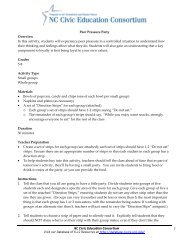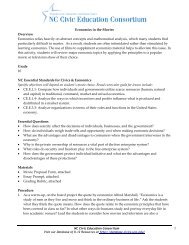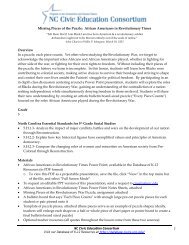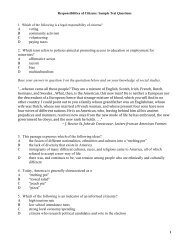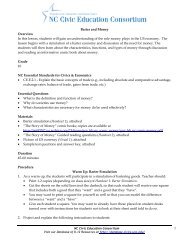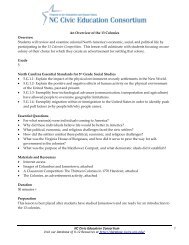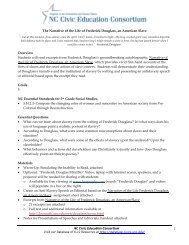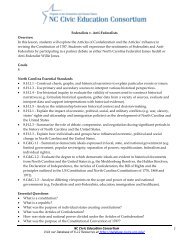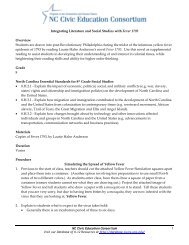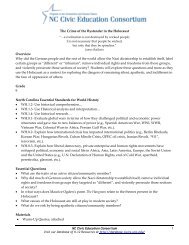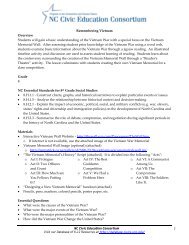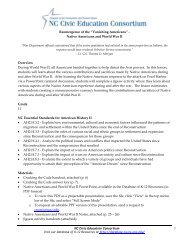Political Parties And Conventions Overview - Database of K-12 ...
Political Parties And Conventions Overview - Database of K-12 ...
Political Parties And Conventions Overview - Database of K-12 ...
- No tags were found...
You also want an ePaper? Increase the reach of your titles
YUMPU automatically turns print PDFs into web optimized ePapers that Google loves.
Democrat or Republican<br />
So, you’ve heard the words Democrat and Republican. But, what do they mean Which political party best<br />
matches your views Perhaps you don’t align yourself with either<br />
Sometimes it is hard to tell the difference between the parties because the issues are infinitely more complex<br />
than the messages <strong>of</strong> 30-second campaign commercials on television or 8-second “sound bites” heard on the<br />
evening news. Additionally, politicians are always trying to say things that are popular and most political<br />
discourse in the United States is filtered through both the lens <strong>of</strong> the media and the notion <strong>of</strong> an “either-or” twoparty<br />
system.<br />
It is also incorrect to suggest that all Democrats share the same beliefs or that there are no factions within the<br />
Republican Party. In general, Democrats are more liberal in that they favor progressive change in society,<br />
freedoms from government intervention into one’s private and social life, and regulations on economic activity<br />
and businesses. In general, Republicans are more conservative in that they favor traditional institutions and the<br />
status quo, restrictions on private and social activities, and freedoms from government controls over economic<br />
activity and businesses. Yet, not all Democrats are liberal and all Republicans conservative. For instance,<br />
people – or both parties and political ideologies – in the American South tend to be more conservative, while<br />
their neighbors in the Northeast and West Coast are typically more liberal. Also, not everyone adheres to the<br />
principles <strong>of</strong> the two major parties and there are several minor or “third parties” in the United States, although<br />
they rarely get their candidates elected.<br />
Nonetheless, there are some noticeable differences in the political parties. In brief, Democrats tend to favor an<br />
active role for government in society and believe that such involvement – be it environmental regulations<br />
against polluting or anti-discrimination laws – can improve the quality <strong>of</strong> our lives and help achieve the larger<br />
goals <strong>of</strong> opportunity and equality. On the other hand, Republicans tend to favor a limited role for government in<br />
society and believe that such reliance on the private sector (businesses and individuals) – be it avoiding<br />
unnecessary environmental regulations or heavy-handed anti-discrimination laws – can improve economic<br />
productivity and help achieve the larger goals <strong>of</strong> freedom and self-reliance.<br />
Below are some issues that are frequently discussed by the news media and politicians. Every four years during<br />
a presidential election, both major parties convene at a national convention and draft a platform, which is an<br />
agenda for the next four years and spells out their positions on the issues <strong>of</strong> the day. The current party platforms<br />
reveal the parties’ positions on the following dozen controversial issues:<br />
Issues<br />
1. Abortion<br />
Democrats: Abortion is a woman’s right and should be legal<br />
Republicans: Abortion should be illegal and restricted by government<br />
2. Flag Burning<br />
Democrats: Flag burning is political speech and is protected by the Constitution<br />
Republicans: Protect the flag from burning by a constitutional amendment<br />
3. Gun Control<br />
Democrats: Favor/Gun control is needed<br />
Republicans: Oppose/Gun control is unconstitutional<br />
4. Natural Environment<br />
Democrats: Strong regulations are needed to protect the environment<br />
Republicans: Strong environmental laws harm the economy<br />
5. Race Relations<br />
Democrats: Strong anti-discrimination laws are needed<br />
NC Civic Education Consortium 10<br />
Visit our <strong>Database</strong> <strong>of</strong> K-<strong>12</strong> Resources at http://database.civics.unc.edu/



